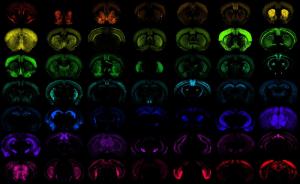Scientists unveil the world's most comprehensive AI-powered tool for neuroscience
Massive, first-of-its-kind data resource aims to accelerate medical breakthroughs in brain diseases like Alzheimer’s and Parkinson's
SEATTLE, WA, UNITED STATES, November 13, 2025 /EINPresswire.com/ -- Imagine if every neuroscientist in the world could suddenly speak the same language and share their discoveries instantly. Allen Institute researchers and engineers have now unlocked that potential and the vast discoveries it could lead to through the new Brain Knowledge Platform (BKP).This first-of-its-kind database and research tool has just launched with data from over 34 million brain cells. It compiles and standardizes the world’s neuroscience data into a common format and language allowing deep, seamless collaboration between international teams all united in the common goal of finding cures for brain disease.
The Allen Institute partnered with technology leaders like Amazon Web Services, which built the core computing infrastructure powering Brain Knowledge Platform, and Google to develop AI models for neuroscience. That collaboration and innovation have created a powerful tool designed to transform how we discover treatments for diseases like Alzheimer's and Parkinson's.
“This is special because the field has long suffered from fragmentation: different labs working in different species, with different modalities, labeling cell types differently, and with datasets that are difficult to align,” said Shoaib Mufti, senior director of data and technology at the Allen Institute. “I am excited about the way the Brain Knowledge Platform will unite massive, multimodal, high-resolution datasets — including single-cell and spatial transcriptomics — all in one open, navigable environment.”
The work is also supported by the National Institutes of Health’s Brain Research Through Advancing Innovative Neurotechnologies® Initiative, or The BRAIN Initiative®, aimed at accelerating the development of innovative neurotechnologies and revolutionizing our understanding of the human brain
Solving the language problem in brain science
For decades, brain researchers have faced a major communications challenge: Labs around the world have relied on a variety of methods and technology to study the brain and classify its diverse cell populations. These labs have adopted their own terminology and classification systems for their findings and cell types—a diversity that has meant neuroscience lacks a standardized, comprehensive vocabulary to describe and understand the brain and its incredible complexity. This lack of alignment has slowed the pace of discovery because it’s as though research teams are speaking different languages, hindering seamless collaboration
The Allen Institute is solving this problem by creating a universal translator for brain science. This new platform takes all the different ways scientists describe brain cells and organizes them into one giant, searchable map that everyone can use.
“The Brain Knowledge Platform is a transformative open resource, giving neuroscience a common language for brain cell types much like the Human Genome Project did for genes,” said Joseph R. Ecker, Ph.D., a Howard Hughes Medical Institute Investigator from the Salk Institute for Biological Studies.
How was artificial intelligence used?
Brain Knowledge Platform uses artificial intelligence (AI) to help scientists find patterns and connections they might miss on their own. For example, a scientist studying a brain cell that seems important in Parkinson's disease can search the platform and instantly see how that same cell behaves in healthy brains, in Alzheimer's patients, and in people with other conditions. AI helps them spot similarities and differences that could lead to new treatments.
The Platform also includes a catalog of genetic tools allowing researchers to immediately begin probing scientific questions that surface. If a researcher finds an interesting brain cell, they can immediately obtain the tools they need to study that cell in their own lab—going from inquiry to action in a single step, with the ultimate goal of discovery.
From discovery to treatment
What makes Brain Knowledge Platform transformative is how it connects basic brain research to actual medical treatments. The platform includes data from both healthy and diseased brains, so researchers can see what goes wrong in conditions like Alzheimer's and Parkinson's. They can identify which brain cells are affected and then test potential treatments on those specific cells.
The AI assistant accelerates discovery and insights by allowing user to search for molecules and cell features through natural language queries, similar generative AI search, making the massive datasets more accessible and easier to navigate.
Breaking down research silos
One of the most exciting aspects is how the platform reveals connections between different brain diseases, and how it may speed up collaboration and big scientific discovery.
“We’ve created and shared high-quality brain maps since our first mouse brain atlas in 2007,” says Hongkui Zeng, Ph.D., executive vice president and director of Brain Science at the Allen Institute. “The Brain Knowledge Platform enhances those maps with the novel understanding of cell types we’ve been developing with others in the NIH’s BRAIN Initiative. Like topography on Google Maps, cell type information adds multiple new layers to our maps, helping scientists design better experiments and glean new insights.”
The platform eliminates wasted effort by making all research discoverable and connected. Instead of spending months rediscovering what someone else already figured out, researchers can build on existing work and focus on the next breakthrough. This could help scientists understand how the brain works as a complete system and develop much more effective treatments for brain diseases.
Liz Dueweke
Allen Institute
+1 206-519-8527
email us here
Visit us on social media:
LinkedIn
Bluesky
Instagram
Facebook
YouTube
TikTok
X
Other
Legal Disclaimer:
EIN Presswire provides this news content "as is" without warranty of any kind. We do not accept any responsibility or liability for the accuracy, content, images, videos, licenses, completeness, legality, or reliability of the information contained in this article. If you have any complaints or copyright issues related to this article, kindly contact the author above.

